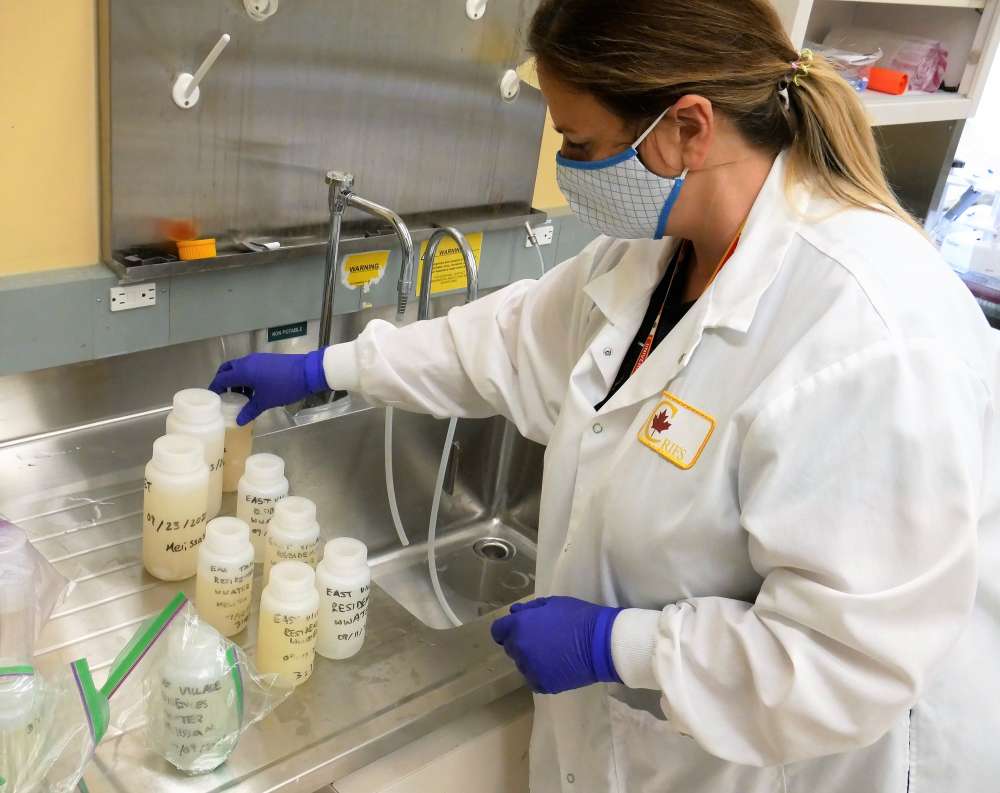Wastewater data from University of Guelph researchers that is crucial for regional monitoring of Omicron will now be publicly available from Wellington-Dufferin-Guelph (WDG) Public Health beginning next week.
Dr. Lawrence Goodridge, professor in the Ontario Agricultural College (OAC), said the wastewater testing data will be posted on the WDG Public Health dashboard. He believes this monitoring data will fill an information gap left since the highly infectious COVID-19-causing variant overwhelmed testing capacity and led health units to stop testing most Canadians.

“Where there’s a vacuum of information, people start to make their own information,” said Goodridge, a member of the Department of Food Science and director of the Canadian Research Institute for Food Safety (CRIFS) on campus. “We lack accurate testing information, so there’s a vacuum. This wastewater data is being used to fill that vacuum.”
Indicators of COVID-19 in wastewater may appear a week before symptoms in infected individuals, providing a critical tool for health authorities to gauge pending changes. He said genomic sequencing in his lab will also be able to detect whether the Omicron BA.2 variant has arrived in the region.
For just over a year, Goodridge and Dr. Marc Habash in OAC’s School of Environmental Sciences have sampled wastewater plants in Guelph and Orangeville for the COVID-19-causing virus. They take samples three times a week and conduct PCR tests on campus. U of G is also testing in the Niagara region.
The U of G team includes wastewater experts Dr. Heather Murphy, Department of Pathobiology in the Ontario Veterinary College, and School of Engineering professor Dr. Ed McBean in the College of Engineering and Physical Sciences.
U of G testing data shared with provincial, regional health authorities

U of G provides its testing results to provincial health authorities, where the data is used along with other information for considering such policy measures as imposing or lifting restrictions on public activities.
The province makes regional information available to public health groups, but only some of those local authorities have regularly posted it for the public. Now, local wastewater testing data will be updated, likely weekly, on the WDG Public Health dashboard, said Goodridge.
He said other Ontario universities also work with local public health on wastewater surveillance.
Goodridge said U of G is one of only a few universities in the province conducting comprehensive regional wastewater testing, as well as testing wastewater five days a week on campus. That testing involves close cooperation between the University and WDG Public Health, he said, including members of the local health unit serving on the campus wastewater testing advisory committee.
“What’s unique is the extent of collaboration between the University and the local public health unit. It’s a collaborative affair. We share data to improve the safety of the whole county while they also help us improve safety on campus.”
He said without daily COVID-19 case counts, wastewater testing programs are even more important to track local disease spread.
“Knowledge is power. This gives the public information to make decisions. A lot of people want to know whether it’s safe to go out, or whether there will be another wave. This will allow individuals to be making their own decisions about what they want to do.”
Goodridge added: “We do this because it provides data regarding the situation in the county. It’s another attempt by public health officials and University researchers to work together to keep everybody safe.”
The U of G team expects to continue its wastewater testing program for at least a year. Beyond COVID-19, said Goodridge, the surveillance system will be useful for tracking future disease outbreaks.
“This is not going to be the last pandemic. This time, we were caught pretty flat-footed. It took a while to ramp up surveillance. These ways of sharing data and working together provide a blueprint so that next time, it won’t take so long – or maybe this system stays in place, and we can hopefully respond more quickly.”
Contact:
Dr. Lawrence Goodridge
goodridl@uoguelph.ca
